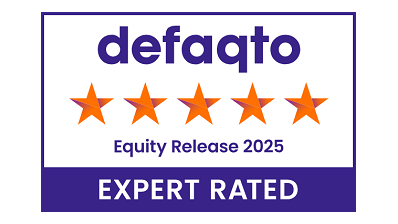
Equity Release
Release some of the cash tied up in your home, tax free, to use however you wish

Equity Release Calculator
Find out how much money you could release with our free calculator.

What is equity release?
Equity release is a tax-free way to release some of the cash tied up in your home, without moving house.
You can use the money however you want. And you choose whether or not to make monthly repayments.
How equity release works
Generally, equity release plans are available to UK residents who are aged 55 or over, and who own a qualifying property worth over £70,000.
There are two main types of equity release: lifetime mortgages and home reversion plans.
A lifetime mortgage is a loan secured against your home. It's repaid once you die or move into long-term care and your house is sold.
You can choose to release the money in one lump sum or in smaller instalments. There are no monthly repayments, although some plans give you the option to make ad-hoc or regular repayments to reduce the amount of compound interest.
A home reversion plan involves selling all or part of your home, but continuing to live there. As it's a sale rather than a loan, no interest is added, but the sale price offered is usually lower than market value.
With all types of equity release, the money you release is tax-free (but could impact some means-tested benefits). You’ll need to use it to pay off any outstanding mortgage first, but you can spend the rest however you like. For example, lots of people use it for home improvements or to help their family.
3 simple first steps if you’re thinking about equity release:
- Use our calculator to see how much you could release with a lifetime mortgage
- Download your free PDF guide
- Arrange a callback for a time that suits you
Important things to know about equity release:
- Equity release comes with drawbacks which are important to consider. It may reduce the amount of inheritance you leave and affect your future financial options, including means-tested benefits
- Homeowner must be over 55 and UK resident (excl. NI)
- The amount released will depend on your age and property value
- Equity release requires paying off any existing mortgage
- Equity release isn't right for everyone, and there are a number of alternatives to equity release that may better meet your needs

The pros and cons
Releasing equity can unlock new opportunities in later life, without having to move home.
But it’s important to understand the costs, and how it can impact future borrowing and inheritance.
The pros and cons of equity release
Releasing equity isn’t right for everyone, so it's important to weigh up the pros and cons. Read our article to understand the common advantages and potential pitfalls.
When you speak to an adviser, they'll walk you through all the pros and cons and what they mean for your personal situation. Here are some of the key considerations they'll discuss with you:
Pros:
- You’ll get tax-free cash for retirement.
- You can stay in your own home until you die or move into permanent care.
- There’s no need for monthly repayments, although you can choose them with some plans.
- It won’t leave your family in equity release-related debt.
- Some plans allow you to ring-fence some of the value of your home to leave as inheritance.
Cons:
- Interest is added each year and is compounded so can grow quickly. This is where you pay interest on the original loan amount, plus the interest that's already been added to the loan.
- There’ll be less inheritance for your family as equity release reduces the value of your estate.
- Means-tested benefits and tax position may be affected.
- You may not be able to borrow more in the future.
- There may be fees to pay, though you can use some of the money you release to cover them.
- If you have an existing mortgage, you’ll need to use the money you release to pay it off first.
Not all of these pros and cons apply to every equity release plan. An adviser will help you to choose the most appropriate plan for your circumstances and depending on what is most important to you.
For more helpful information on equity release, download your free PDF guide or speak to the SunLife Equity Release Service

Are you eligible for equity release?
Check your eligibility online in moments, or call the SunLife Equity Release Service for free on 0800 633 55 66

5 Star rated equity release
A 5 Star Defaqto rating – find out more.
Sunrise lifetime mortgages
What are Sunrise lifetime mortgages?
The Sunrise lifetime mortgages are a suite of equity release products available through the SunLife Equity Release Service.
You may be able to release some of the equity in your home, either as a lump sum or in instalments – and it’s tax free. Then, when you die or go into long-term care, the money is repaid along with any compound interest – usually from the sale of your house.
What makes them different?
In a word – flexibility. Whether you want to downsize, repay early or make partial repayments, it’s all possible.
And of course there’s the 5 Star rating from Defaqto – so you can be certain you’re in safe hands.
Key features of Sunrise equity release
Who's eligible for Sunrise lifetime mortgages?
If you’re 55 years old or over, and own a home worth £99,000 or more, you could be eligible. An equity release adviser will talk you through your options based on your personal circumstances. In some cases other products or alternatives to equity release may be better suited, and Sunrise products and their benefits may not be available to you.
Sunrise products are not available in Northern Ireland.
Important to know
- A Lifetime mortgage is a loan which increases with compound interest. It’s repaid when you die or move into long-term care. It may reduce the amount of inheritance you leave and affect your future financial options, including means-tested benefits
- Homeowner must be over 55 and UK resident (excl. NI)
- The amount released will depend on your age and property value
- Equity release requires paying off any existing mortgage
Want to know more?
- Use our calculator to see how much you could release
- Find out if you’re eligible for equity release
- Download our free PDF guide to equity release
Want to talk it through with an expert? (It’s free)
Call 0800 633 55 66 Or Arrange a call back >

Claim your free digital equity release guide
Simple, jargon-free equity release guide. See whether releasing some of the equity in your home could be right for you.

Current interest rates
Call today for an up-to-date list of lifetime mortgage interest rates for Sunrise equity release products.
Call FREE 0800 633 55 66
About lifetime mortgage interest rates
When you speak to an adviser through the SunLife Equity Release Service, they’ll aim to find the right equity release plan for you with the lowest interest rate available. This will depend on your circumstances and the plan type that’s most suitable for you.
The interest that builds up (known as compound interest) is usually paid off with the rest of your equity release loan, either when you pass away or move into long-term care.
With a lifetime mortgage, interest is usually added in the first month. Then the following month’s interest is added to your loan amount plus the previous month’s interest. This carries on for as long as you have your loan, meaning the total amount owed can grow significantly over time.
Some equity release plans give you the option to pay off some or all of your interest with regular or ad-hoc payments. An adviser can discuss this option with you in more detail.
To see examples and find out more about how lifetime mortgage interest rates work, read our article How much does equity release cost?
If you’d like to know more about lifetime mortgage interest rates and what equity release could mean for you,
Call the SunLife Equity Release Service on 0800 633 55 66 Or Arrange a call back >
Who's eligible for Sunrise lifetime mortgages?
If you’re 55 years old or over, and own a home worth £99,000 or more, you could be eligible. An equity release adviser will talk you through your options based on your personal circumstances. In some cases other products or alternatives to equity release will be better suited, and Sunrise products and their benefits may not be available to you.
Sunrise products are not available in Northern Ireland.
Important to know
- Equity release comes with drawbacks which are important to consider. It may reduce the amount of inheritance you leave and affect your future financial options, including means-tested benefits
- Homeowner must be over 55 and UK resident (excl. NI)
- The amount released will depend on your age and property value
- Equity release requires paying off any existing mortgage
Got a question? Arrange a call for a time that suits you
Or call the SunLife Equity Release Service today, free on 0800 633 55 66

Could equity release be right for you?
Let's take a closer look at equity release and see if releasing money from your home could be right for you.
Video transcript

Life Well Spent report 2024
What big spends are making over 50s happier in later life?

How much is your home worth?
Find out how to get a free property value estimation online.

Is equity release right for you?
Deciding if equity release is right for you
If you’re aged 55 years or older, and a UK homeowner with a property worth at least £70,000, you could release equity. But whether or not it’s right for you will depend largely on your personal circumstances. If you agree with the statements below, then it could be an option worth exploring.
You don't want to make monthly repayments
Releasing equity lets you access your cash tax-free in one lump sum, or in smaller instalments. Generally, you do not have to pay monthly repayments on your loan. With a lifetime mortgage, there are typically no monthly repayments to make. This is because the loan, plus compound interest, is repaid when the plan comes to an end.
There are equity release products that come with the option of making regular payments to help reduce the total cost of borrowing. Even if you're only able to make small repayments, it'll help reduce the amount of interest you pay over the lifetime of your loan.
You want to stay in your own home
One of the main advantages of releasing equity is the right to stay in your own home. For lifetime mortgages your home will only be sold when you pass away or go into long term care.
You understand it will reduce the inheritance you leave behind
Equity release is designed to help you and your loved ones enjoy your money during your lifetime. The equity you release, along with any compounded interest, is paid back from the sale of your home, so there will be less money available for inheritance.
You want the freedom to spend your money however you like
Once you receive your cash, you’re free to spend the money how you wish. The only exception is if you have a balance left on your mortgage, in which case you’ll need to use some of the cash to pay it off first.
The money can be used for all sorts of things, including home and garden improvements, paying off debts, early inheritance for your family. You should always think carefully before securing a loan against your property.
Remember, equity release isn’t right for everyone, so it’s important to get expert advice before you go ahead. You may even want to look into alternatives to equity release.
Call 0800 633 55 66 to speak to the SunLife Equity Release Service for free, or try our eligibility checker tool

Types of equity release schemes available
The different types of equity release schemes
Your equity release adviser will discuss different schemes and how they might work for your personal circumstances.
Lifetime mortgage
Access a lump sum, with no need for monthly repayments, and you’ll still own your own home. With a lifetime mortgage, there are typically no monthly repayments to make. This is because the loan, plus compound interest, is repaid when the plan comes to an end.
There are equity release products that come with the option of making regular payments to help reduce the total cost of borrowing. Even if you're only able to make small repayments, it'll help reduce the amount of interest you pay over the lifetime of your loan.
Find out more about lifetime mortgages.
Drawdown lifetime mortgage
Release cash in instalments over time, and only pay interest on what you’ve taken.
Find out more about drawdown lifetime mortgages.
Interest-only lifetime mortgage
Release tax-free cash, and reduce interest by making repayments.
Find out more about interest-only lifetime mortgages.
Home reversion plan
You sell all or part of your home to a reversion company to access a lump sum and live there rent-free. (Home reversion plans aren't currently offered by The SunLife Equity Release Service.)
Find out more about home reversion.
For more helpful information on equity release, download your free PDF guide or arrange a call back from the SunLife Equity Release Service for a time that suits you.

Speaking to an adviser
What to expect when speaking to an adviser
An adviser through the SunLife Equity Release Service can help you decide if releasing equity is right for you.
You can speak to them over the phone, through a video call, or face-to-face. They’ll explain all of the details and the options available. To help you get started, we’ve compiled a list of possible questions you can ask your adviser.
Why speak to an equity release adviser?
You have to get equity release advice before you apply, but it’s also a really helpful first step. Here’s why:
They’ll answer all your questions
You can ask your adviser anything about equity release.
If it’s not right for you, they’ll say so
They’ll advise against equity release if they don’t think it’s suitable for you.
They’ll tell you about our best rates
Once they've assessed your suitability, an adviser will discuss your options based on your personal circumstances.
Call the SunLife Equity Release Service on 0800 633 55 66 to be connected to an expert adviser

Applying for equity release
How to apply step-by-step
Applying for equity release isn’t a rushed process. There’s lots of advice and support along the way to make sure it’s right for you.
- Check you’re eligible for equity release
You can check your eligibility online, or by calling the SunLife Equity Release Service on 0800 633 55 66. If you call, you’ll be asked a few short questions to determine your eligibility. If you’re eligible and you’d like to know more, the team can put you through to an expert adviser. - Talk it through with your adviser
You’ll discuss your circumstances, the options available and whether equity release is the right option for you. You can talk to your adviser as many times as you need. Depending on what product might be right for you, they will be able to let you know if there are any fees which apply. - Complete your application
Your adviser will recommend the best plan for you and send you all the information. If you decide to go ahead, you’ll need to complete an application. Your adviser can help with this. - Get independent legal advice
You’ll need to speak with a solicitor once you’ve returned your application. Your adviser can suggest suitable solicitors if you’d like them to. - Receive your money
You’ll usually receive your cash lump sum or first instalment within 6–8 weeks of returning your application, but it could be sooner or longer – there's no guaranteed timescale.
Have a question? Call the SunLife Equity Release Service for free on 0800 633 55 66 or arrange a call back.

Selling your home or repaying your equity release loan early
Selling your home or repaying your equity release early
How you can repay the equity you’ve borrowed early will depend on your plan provider. There are often early repayment fees, so it’s best to check with your provider and equity release adviser before making any decisions.
Selling your house after equity release
With many schemes you can still move home once you’ve released equity. Just be aware that certain conditions may apply and there may be fees to pay. Your adviser can discuss this with you in more detail.
If you’re thinking about releasing equity and want to know more about what happens afterwards, it’s best to speak to an expert adviser. Different plans and providers vary in how they approach the sale of your home and early repayments (if you want to make them). An adviser can take you through the plans that are best suited to you.
Have a question? Call the SunLife Equity Release Service for free on 0800 633 55 66 or arrange a call back.

What happens when you die or move into care
How your equity release will be repaid
There are a few options, depending on the type of plan you choose.
With a lifetime mortgage, the person who is in charge of your estate – perhaps your spouse or child – usually sells your home. Then the money made from the sale repays your equity release loan, including any outstanding interest.
If you don't leave your house to anyone in your will, or if you have a home reversion plan, your equity release provider will arrange the sale and repayment instead.
The loan usually needs to be repaid within 6–12 months of your passing.
Your expert adviser will let you know what your options are right from the get-go. Just remember to keep your family in the loop, so they know what to expect when the time comes.
To find out more about equity release, download your free PDF guide or arrange a call back
Answers to your questions
SunLife Limited receives an introductory commission from Phoenix Life Limited or Key Retirement Solutions, if you take out a product. The amount is a percentage of the loan’s final value. Tied advice provided via the SunLife Equity Release Service.
Legal and regulatory information
SunLife Limited is an authorised introducer to the SunLife Equity Release Service, which is a trading name of Key Advice Solutions Limited, whose permitted business is advising and arranging equity release transactions.
SunLife Limited, Registered office: 1 Wythall Green Way, Wythall, Birmingham, B47 6WG, United Kingdom. Registered in England and Wales, number 05460862. SunLife Limited is authorised and regulated by the Financial Conduct Authority and is entered on the Financial Services Register (reference number: 769427).
Key Advice Solutions Limited (reference number: 979290) is an appointed representative of Key Retirement Solutions Limited (reference number: 224987) which is authorised and regulated by the Financial Conduct Authority(www.fca.org.uk opens in a new tab). Registered office: Baines House, 4 Midgery Court, Fulwood, Preston, PR2 9ZH.
The Sunrise Equity Release Mortgage Product is manufactured and administered by Standard Life Home Finance Limited. Registered in England No 13352642. Registered Office: Baines House, Midgery Court, Pittman Way, Fulwood, Preston PR2 9ZH. www.standardlifehomefinance.co.uk(opens in a new tab). Standard Life Home Finance Limited is authorised and regulated by the Financial Conduct Authority. Standard Life Home Finance Limited uses the Standard Life brand under licence.
